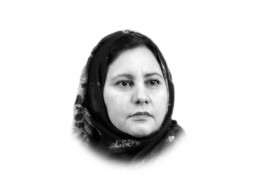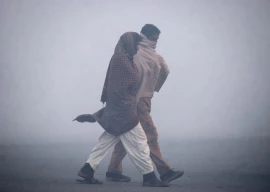
It is hard to refute the fact that the Taliban and other religious extremists have been stepping up their deadly attacks against civilians and public spaces across Pakistan during this past year, targeting nearly every sector of society.
In addition to the lingering violence in the tribal areas and the Swat valley, the country's largest cities are not safe either. The wrath of the militants is not confined towards religious minorities — they have also targeted the widely venerated Data Darbar and Abdullah Shah Ghazi shrines. The assassination of the Punjab governor is also indicative of the deteriorating capacity of the state to offer protection to even its highest officials.
Human Rights Watch points to the fact that the government's response to militant attacks itself routinely violates basic rights. For instance, it mentions how thousands of Taliban suspects are being held in unlawful military detention without charge.
However, this report is simultaneously critical of the US role in this scenario. Although the assessment was published before the Raymond Davis incident in Lahore, and has thus not paid sufficient attention to the increasing impunity of US covert operatives within Pakistan, it does admit that US aerial drone strikes near Pakistan's border with Afghanistan have been escalating and are accompanied by persistent claims of large numbers of civilian casualties. It blames the US for overlooking potential human rights abuses under military operations supported by it. US authorities must pay serious heed to these issues.
Rights groups based within the US must ensure that they apply pressure on the US armed forces to improve its own human rights record and to ensure that its government’s actions and aid help protect human rights in Pakistan, instead of worsening them.
On a separate note, the brewing discontent in Balochistan has been viewed with concern by Human Rights Watch. Another package of reforms aimed at providing redress for Baloch grievances has been introduced, however civilian authorities are described as being unable to implement them.
Significantly, the report notes how Pakistan's independent judiciary has caused controversy by overstepping its constitutional authority, especially to muzzle criticism of judicial conduct. It rightly points out that no government institution, including the courts, should be immune from public debate. Pakistan's judicial system is cautioned to use its newfound independence to help bolster transparency and justice, instead of undermining it.
Instead of wasting energy trying to undermine, deny or contradict these findings, our government must focus on doing more to protect those at risk, and making concerted efforts to deter those inciting violence and perpetuating glaring rights abuses.
Published in The Express Tribune, February 7th, 2011.

1726117332-0/Megan-Thee-Stallion-(1)1726117332-0-165x106.webp)

















COMMENTS (1)
Comments are moderated and generally will be posted if they are on-topic and not abusive.
For more information, please see our Comments FAQ